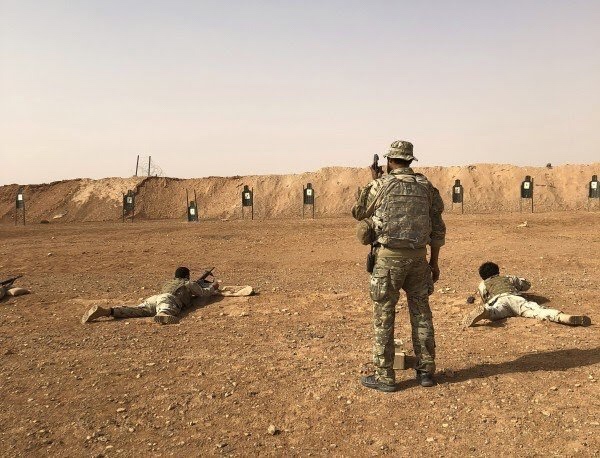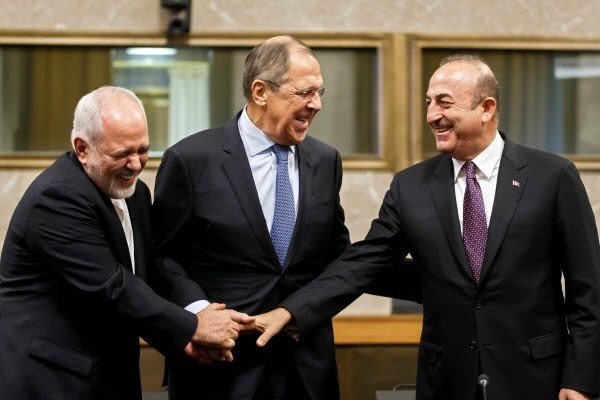
Members of the Syrian opposition receive training from the U.S. Army Oct. 22, at the Tanf military outpost in southern Syria. (Lolita Baldor/AP)
U.S. troop withdrawal from Syria is ‘a dream come true for the Iranians’
By Liz Sly, Loveday Morris
December 21, 2018 at 7:09 PM
BEIRUT —One of the biggest winners of President Trump’s decision to withdraw troops from Syria will be Iran, which can now expand its reach across the Middle East with Washington’s already waning influence taking another hit.
The abrupt reversal of U.S. policy regarding its small military presence in a remote but strategically significant corner of northeastern Syria has stunned U.S. allies, many of whom were counting on the Trump administration’s seemingly tough posture on Iran to reverse extensive gains made by Tehran in recent years.
Instead, the withdrawal of troops opens the door to further Iranian expansion, including the establishment of a land corridor from Tehran to the Mediterranean that will enhance Iran’s ability to directly challenge Israel. It also throws in doubt Washington’s ability to sustain its commitment to other allies in the region and could drive many of them closer to Russia, an Iranian ally, analysts say.
“This is a dream come true for the Iranians,” said Riad Kahwaji, who heads the Institute for Near East and Gulf Military Analysis, a defense consultancy in Dubai. “No longer will Iran take the Trump administration seriously. It’s an isolationist administration, it will no longer pose a threat, and Iran will become bolder in its actions because they know this administration is more bark than bite.”
A top Iranian official gloated Friday that the United States has admitted failure in its attempts to “overrun” the Middle East, according to Iran’s Tasnim News Agency.

From left, Iranian Foreign Minister Mohammad Javad Zarif, Russian Foreign Minister Sergei Lavrov and Turkish Foreign Minister Mevlut Cavusoglu join hands following consultations this month on Syria at the United Nations in Geneva. (Salvatore Di Nolfi/EPA-EFE/REX/Shutterstock)
“The Americans have come to the conclusion that they can exercise power neither in Iraq and Syria nor in the entire region,” said Brig. Gen. Mohammad Pakpour, the commander of ground forces of the Revolutionary Guard Corps, at a news conference in Tehran.
The most immediate impact will be in Syria, where U.S. troops have been serving as a buffer against Iranian expansion throughout the country as Syrian President Bashar al-Assad — backed by Iranian-trained and funded militias — consolidates control over areas that rebelled against him in 2011.
The area in northeastern Syria where most of an estimated 2,000 U.S. troops are based is now up for grabs, with both Turkey and the Syrian government vying for control.
The Syrian Kurds, who manage the area, say they are hoping to reach a deal with Assad, which would head off a feared Turkish incursion — and bring the Iranian-allied government into areas overseen by the U.S. military.
Of more immediate concern to Israel is a much smaller toehold the U.S. military has maintained at Tanf, a tiny territory in Syria along the border of Iraq and Jordan.
The Trump administration has not said whether the withdrawal plan includes Tanf, where around 250 U.S. Special Forces are based alongside a Pentagon-trained unit of former Free Syrian Army rebels.
The rebel commander, Muhannad al-Talla, said the rebels had been told to prepare for a U.S. pullout, although they were not given a date.
The U.S. base is located at the border crossing between Iraq and Syria, along the shortest link between Tehran and the Syrian capital of Damascus, a route Iran could use to sustain the growing arsenal of missiles and rockets that its ally Hezbollah is building in Lebanon.
The unilateral decision to withdraw, without a plan for what comes next, has called into question the Israeli assumption that it can count on the United States to protect Israel against Iran, Israeli analysts said.
“The sense now in Israel is that Israel is essentially alone in the task of back-walling the Iranian military presence in Syria,” said Ofer Zalzberg, a Jerusalem-based analyst with the International Crisis Group. “This decision feeds the notion that is prevalent in the region, even if it’s not entirely correct, that the U.S. is withdrawing. Many people draw delight from this, specifically in Tehran and Moscow.”
Iran is already close to restoring another land route across Iraq through Syria and into Lebanon via the Iraqi-Syrian border crossing linking the Syrian town of Bukamal and the Iraqi town of Qaim. This location is a crossroads of geopolitical conflict where the forces of the Islamic State, the Syrian government, Iranian-backed militias, Russia, the United States and the U.S.-backed Syrian Democratic Forces are battling for control.
With the United States withdrawing its troops from the Syrian side of the border, Israel is concerned about whether it will also pull out from Iraq, where around 5,200 U.S. troops are based and mostly provide training and advice to the Iraqi Army, said Brig. Gen. Eli Ben Meir, who formerly headed the Israeli military’s research analysis division. The United States maintains a base just across the border from Bukamal, in Qaim, which will continue to act as a deterrent to Iran’s unfettered access to the area after troops leave Syria, while the U.S. presence in Iraq more broadly exerts some restraint on Iran’s ability to exercise full control.
“The most important thing from Israel’s aspect and Israeli strategy is how the U.S. military existence in Iraq, and especially on the Iraqi-Syrian border, will reshape, if at all, because of this withdrawal,” Meir said in a conference call with journalists in Israel. “Iran wants to be more involved in what’s going on in Syria, but there is Iraq that is between.”
The decision to withdraw from Syria on the grounds that the Islamic State has been defeated, as Trump claimed, is also likely to bolster demands from Iran’s Shiite Iraqi allies for the withdrawal of U.S. troops from Iraq, said Hoshyar Zebari, Iraq’s former foreign minister. He predicted an intensified effort in the Iraqi parliament, where Iran-backed militia groups control at least a third of its seats and could count on support from others opposed to the U.S. presence to push for a U.S. withdrawal.
“The logic is that if the U.S. has defeated ISIS in Syria and is withdrawing, ISIS is defeated in Iraq and they should also withdraw from Iraq,” he said.
Morris reported from Jerusalem. Zakaria Zakaria in Brazil contributed to this report.
Liz Sly is The Washington Post’s Beirut bureau chief, covering Lebanon, Syria and the wider region. She has spent more than 17 years covering the Middle East, including the first and second Iraq wars. Other postings include Washington, Africa, China, Afghanistan and Italy.
Loveday Morris is The Washington Post's Jerusalem bureau chief. She was previously based in Baghdad and Beirut for The Post.
No comments:
Post a Comment